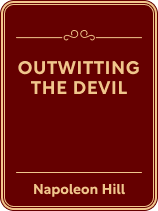

This article is an excerpt from the Shortform book guide to "Outwitting the Devil" by Napoleon Hill. Shortform has the world's best summaries and analyses of books you should be reading.
Like this article? Sign up for a free trial here .
Are you just drifting through life? How much are you in danger of being under the devil’s influence?
In the book Outwitting the Devil, Napoleon Hill writes that the devil distinguishes between two types of people: those under his control, whom he claims to make up nearly 98% of all people on Earth; and those who have escaped his influence. What separates these two groups is that those under his influence take a fundamentally passive role in their own lives, while those who have resisted take a more active role. Much of Hill’s advice to the reader encourages them to take on a more active role, taking control of what happens to them out of the devil’s hands and into their own.
Read more to learn why and how the devil takes advantage of passive people.
Passive People Under the Devil’s Influence
Hill describes those under the devil’s control as passive people who are “drifting” through life, suffering from something that we’ll call indifference. Someone suffering from indifference has no goals, no motivation, and no self-control. They fall easily into bad habits and failure, and they’ll never achieve true happiness or success. They’re always procrastinating, never proactive, and they avoid taking responsibility for their own actions. Above all, Hill says, they’re bound to be manipulated by people with stronger personalities, and the circumstances of their lives are ultimately controlled by the devil.
The primary characteristics of passive people are as follows:
- They are directionless and unmotivated, rarely finishing what projects they start and being easily discouraged by setbacks.
- They are bad partners, either personally or professionally, being unreliable, overly critical of others, dishonest, and often repeating their mistakes.
- They fall easily into unhealthy habits and are easily distracted from their greater purpose or goals.
| Taking Responsibility Hill repeatedly emphasizes the role of personal responsibility in escaping the devil’s influence. Though the devil works against you to make you drift, you’re still complicit in your indifferent behavior by failing to break yourself out of bad habits or by making excuses for yourself. Improving takes hard work and, as Hill will tell us, only a proactive person can find success. We see similar approaches to Hill in a number of Christian self-help movements, perhaps most famously in Alcoholics Anonymous’s twelve-step process. AA simultaneously encourages you to accept that you can’t control everything and put your faith into a higher power, and asks you to acknowledge the ways in which you’ve failed or hurt the people in your life. The program’s steps are designed to instill changes that will counteract the traits of indifferent people that Hill describes: They prompt you to commit to a direction by keeping your eye on a goal (sobriety), to become a better partner to others by admitting wrongdoing and making amends, and to develop healthy habits that will deliver you toward your goal rather than distract you from it. These experts agree that whether you’re trying to escape bad circumstances or just want to improve your life, you need to take responsibility for yourself and how you behave to have any hope of success. Complacency, more than anything else, will keep you under the devil’s influence. |

———End of Preview———
Like what you just read? Read the rest of the world's best book summary and analysis of Napoleon Hill's "Outwitting the Devil" at Shortform .
Here's what you'll find in our full Outwitting the Devil summary :
- How failure and bad habits keep people from reaching their potential
- How to escape the Devil’s influence and avoid being turned toward inaction
- How to find your way to professional and financial success






